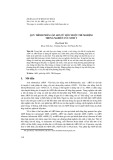
TRI Reagent
-
Trong bài báo này, tác giả trình bày một phương pháp phân lập ARN từ các mô bào chuột thí nghiệm sử dụng TRI Reagent để phục vụ nghiên cứu sinh y. Kết quả cho thấy phương pháp phân lập của chúng tôi đảm bảo chất lượng, số lượng và tính toàn vẹn của ARN, tương đương với phương pháp đối chứng sử dụng kít phân lập. Phương pháp của chúng tôi tuy mất thời gian hơn nhưng lại có chi phí thấp hơn phương pháp đối chứng.
 7p
7p  tamynhan5
tamynhan5
 10-12-2020
10-12-2020
 23
23
 2
2
 Download
Download
-
The selective manipulation of the expression and replica-tion of mitochondrial DNA (mtDNA) within mammalian cells has proven difficult. In progressing towards this goal we synthesized a novel mitochondria-targeted DNA-alkylating reagent. The active alkylating moiety [(11aS)-8-hydroxy-7-methoxy-1,2,3,11a-tetrahydro-5H-pyrrolo[2,1-c] [1,4]benzodiazepin-5-one (DC-81)], irreversibly alkylates guanine bases in DNA (with a preference for AGA tri-plets), preventing its expression and replication.
 10p
10p  fptmusic
fptmusic
 16-04-2013
16-04-2013
 33
33
 4
4
 Download
Download
-
Approach to the Patient: Disorders of the Sense of Taste Patients who complain of loss of taste should be evaluated for both gustatory and olfactory function. Clinical assessment of taste is not as well developed or standardized as that of smell. The first step is to perform suprathreshold whole-mouth taste testing for quality, intensity, and pleasantness perception of four taste qualities: sweet, salty, sour, and bitter. Most commonly used reagents for taste testing are sucrose, citric acid or hydrochloric acid, caffeine or quinine (sulfate or hydrochloride), and sodium chloride.
 5p
5p  ongxaemnumber1
ongxaemnumber1
 29-11-2010
29-11-2010
 76
76
 5
5
 Download
Download
CHỦ ĐỀ BẠN MUỐN TÌM









![Báo cáo khoa học: Specific targeting of a DNA-alkylating reagent to mitochondria Synthesis and characterization of [4-((11aS)-7-methoxy-1,2,3,11a-tetrahydro-5H-pyrrolo[2,1-c][1,4]benzodiazepin-5-on-8-oxy)butyl]-triphenylphosphonium iodide Báo cáo khoa học: Specific targeting of a DNA-alkylating reagent to mitochondria Synthesis and characterization of [4-((11aS)-7-methoxy-1,2,3,11a-tetrahydro-5H-pyrrolo[2,1-c][1,4]benzodiazepin-5-on-8-oxy)butyl]-triphenylphosphonium iodide](https://tailieu.vn/image/document/thumbnail/2013/20130416/fptmusic/135x160/2411366103582.jpg)





